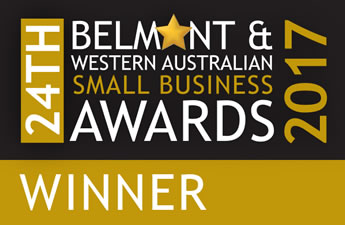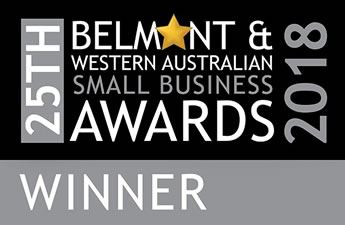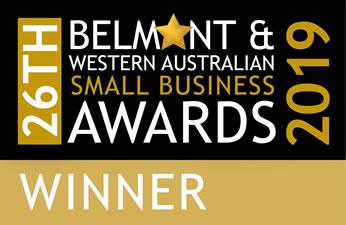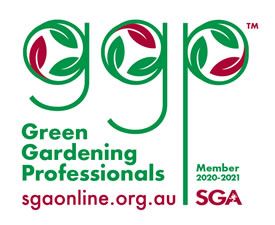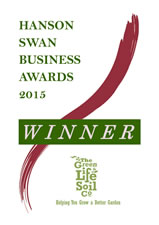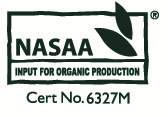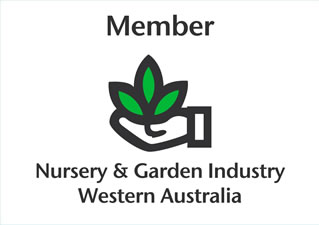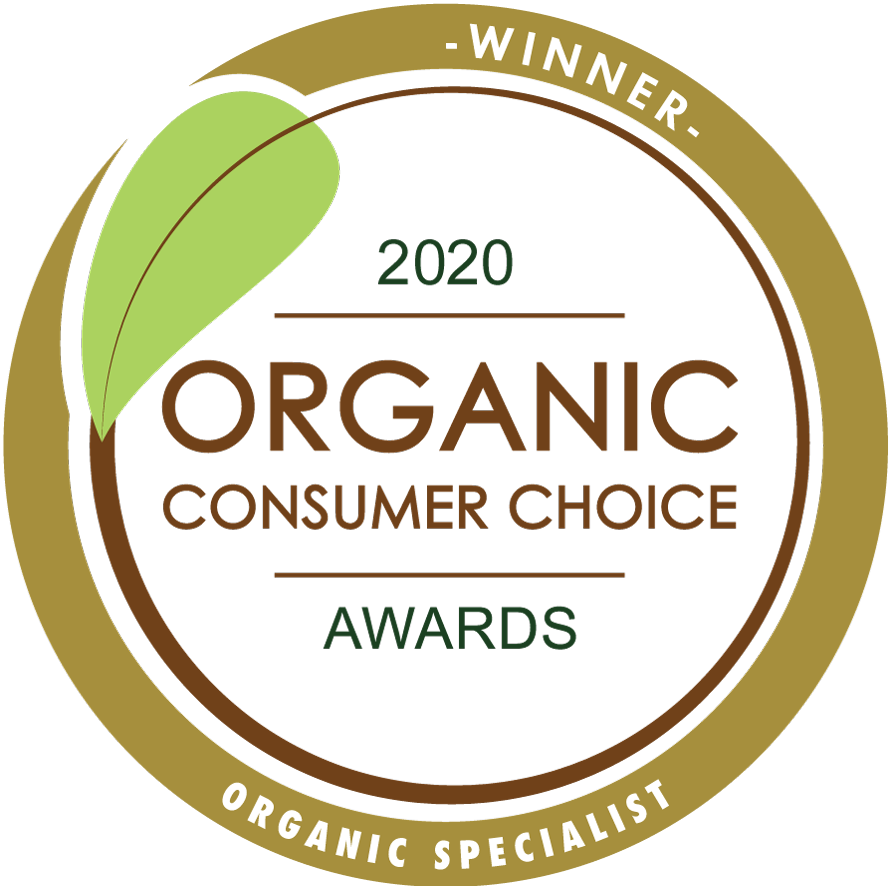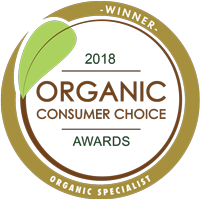| item(s), Total: $0.00 View Cart |
| Shopping cart is empty. |
Spring has officially arrived, and I'm sure your plants have noticed! Things are definitely starting to take off - especially the weeds it seems! September is also National Biodiversity Month - which is just perfect timing for us organic gardeners! National Landcare week is 5th - 11th September, and National Organic Week is 16th - 24th September. All of these "events" are designed to start conversations and raise awareness, so why not take the opportunity to talk to colleagues/neighbours/family and engage them in thinking a little about their impact on the environment and how we can - at the very least - provide a little patch of biodiversity in our own back yard.Remember our NEW schedule of workshops is now LIVE on our website... So do head on over to the 'Events' page and check the program out. Please feel free to share with your network, and those who may be keen to embrace gardening and/or a more sustainable lifestyle, but need a little inspiration to get started on their journey.Northern suburbs peeps - the Churchlands Senior High School 'Good2Grow' event is on again Saturday 9th September. There's fundraising sales of garden goodies, market stalls and FREE talks all day on a whole range of gardening & sustainability talks (worms, compost, wicking beds, seed saving, bugs in the garden, edible weeds and fermenting... Phew!) Come on down and say 'hi' I'll be doing a short talk from about 9.30 about getting your garden cranking for Spring. Check out their Facebook page & find more info here.Green Life is pleased to announce we're now members of NGIWA (Nursery & Garden Industry of WA). This industry group brings a number of independent garden centres and allied businesses together; sharing knowledge and working together to raise the profile of the horticulture industry throughout the State. It brings opportunities for additional staff training, regular networking and 'cross pollination' of ideas to help us improve in what we do.Do it in a Dress
If you've been customers of GLSC for a while, you may recall that for the last two years we've supported "Do it in a Dress" - a charity that supports educating girls in Africa who would otherwise not receive the opportunity to go to school. Statistics show that educating girls/women in a community leads to better health outcomes, smaller families and a reduction in poverty. It's a worthy cause - plus the fun part is that we all get to wear a dress for the weekend - even the male members of our team. In fact, I'd go so far as to say it's ESPECIALLY the male members of our team who relish the opportunity to wear a dress - so I hope you'll support us as we have a bit of fun and raise some money. We'll have more information in next month's newsletter - but for now mark the weekend of 21 - 22nd October in your diary to pay us a visit and join in the fun. (Photo shows a bit of fun from 2015!)Now that Spring is here, if you're wanting a delivery for the weekend please do try to book it in by mid week; our schedule does start to fill up a few days out and we don't like to disappoint. For those of you who live in the South-Eastern suburbs, Kieron from Ralphy's Earthworks in Forrestdale has prices for small uteloads of Green Life products delivered on his Facebook page; might pay to check it out and save yourself a trip with a trailer!We hope to see you soon @ The Green Life Soil Co.
Linda & the TeamIN THIS NEWSLETTER:September Jobs to do in the Garden JOBS TO DO - SEPTEMBER GARDEN
Watch for pests! Cabbage butterfly are already around; but their numbers will be on the rise now it's warming up. Exclusion netting is a good option for organic gardeners, but remember to very carefully check existing vegie plants for ANY signs of infestation first! We've got vegie netting packs (6m x 10m for $44 in stock). Snails are still active now too (as evidenced by some of my broccoli plants) - so remember we have the low toxicity iron based Multiguard and the Protect-Us (certified organic) pellets available if you need help dealing with our slimy friends.
Plant some flowers! It's time for sunflowers (who doesn't love them?), marigolds, petunias, zinnia, nasturtiums, cosmos... get some spring/summer colour happening and provide something for the pollinators and other beneficial insects.
Think ahead. You might hate me for dropping the C-bomb here (I mean Christmas, of course) so if you want to give some lovely home grown gifts, look around NOW for what can be divided or propagated that will be established and looking fantastic in a few month's time. (I've given you SO much warning you've got time to dust off your craft skills and make a macrame pot hanger to go with it!) WHAT TO PLANT NOW
Other ideas include: Artichokes (Globe and Jerusalem), Asian Greens, Asparagus, Beans, Beetroot, Broccoli*, Cabbage*, Capsicum, Chilli, Carrot, Celery, Coriander, Cucumber, Dill, Eggplant, Kale*, Kohl rabi*, Leek, Lettuce, Onion, Parsnip, Peas, Potato, Pumpkin, Radish, Rocket, Silverbeet, Snowpeas, Spring Onion, Tomato, Turnips, Zucchini. * While we can still grow most brassicas at this time of year, be aware the pest numbers are increasing, so you will need to be vigilant to defend against caterpillars. Insect netting is a good option but make sure you have excluded any insects from the start. As discussed above, the spring/summer organically grown vegie range will be trickling through from now on, but remember we've also got organic and heritage seed varieties, seed raising mix, cocopeat, microgreens pots and seeds, etc. if you want to have a go at growing your own. Check out our 'When to Sow in Perth' chart and e-book 'Top 12 Edible Plants for Spring/Summer' - Free downloadable guides here. Green Manure
FERTILISE WISELY - HOW HEALTHY IS YOUR SOIL?Spring is a fantastic time to feed most plants in your garden. We're often asked lots of questions about fertlisers - which kind are the best, and how to use them. Unfortunately it's not a 'one size fits all' option. It's a bit like choosing a car. Sure - they might all get you from A to B but we all have different needs based on our lifestyle, family situation and occupation that means some models are more suitable to you than others. So let's look a bit more closely and see if we can help you to choose. While there's lots of brands out there, there are two main types of fertilisers - 'organic' and 'inorganic'. They both have their uses in the garden, depending on what results you're looking for.
Physical properties - soil texture (the amount of sand/silt/clay/loam you have) and soil structure (how these different particles are arranged together with organic matter) is important from the perspective of water holding in your soil, as well as a plants ability to send root hairs through the spaces between soil aggregates, and the amount of air held in the soil. Soil structure also impacts how well the soil can hold onto nutrients; but this is also impacted by the living organisms in your soil. Biological characteristics - a healthy soil contains a wide range of algae, protozoa, bacteria, beneficial nematodes, fungi etc. that have a huge role in making nutrients and water available to your plants, and in overall plant health and growth cycles. A teaspoon of soil can contain more than a billion living organisms - it's the soil food web we rely on at the most basic level of the food chain.
Soil science is a fascinating and highly complex area of study. But thankfully for people like me; you don't need a degree to be a gardener. For thousands of years, people have been growing food and passing on their experience to the next generation. It really does keep coming back to the soil, as I hope I can explain here. If the physical properties of your soil aren't great; there are things you can do to improve that. Whether you have very sandy soil or heavy clay - adding some organic matter is going to help. In an ideal world, where we have the space and time to collect lawn clippings from neighbours, coffee grinds from the local cafe, and have our own weeds, tree prunings and food scraps - we can make our own gorgeous compost and use this to replenish the soil each season. We certainly encourage you to do that - on whatever scale is manageable for you. Whether you have a worm farm, compost tumbler or bokashi bucket - there's LOTS of reasons we should be diverting waste from landfill and using it in our garden. However, if you don't have the space, available resources or confidence - you might need to look at other ways to increase your soil's fertility. If you're starting out in a new house and all you have around you is bare sand you are going to need a little patience and help to get a garden going - but it IS possible. We'd encourage you to concentrate on one area first and build your soil over time.
The chemical side of soil is also impacted by adding organic matter. Of course, it does totally depend on what made up the organic matter in the first place. If the compost material contained no boron (for example), boron won't magically appear in your garden or your vegies*. But the good news is if you tend to use a VARIETY of organic matter in your garden you are most likely getting a broad range of chemical elements. Or, if you're adding trace elements and then composting all your garden waste - most of those elements are going to say in the nutrient loop and be recycled. (Nitrogen is a possible exception here as legumes have the unique ability to capture atmospheric nitrogen and convert it to a plant available form - but that's a whole other story.) Cool, huh? So, that's why for millennia humans have managed OK by using animal dung, human manure, decaying animals & plant matter recycled back into the earth. It might not be perfect, but it tends to work. Then, sometime in the last hundred years, apparently we got smarter and science was able to separate and in some cases manufacture the chemical elements that are the building blocks of life. This was hailed as a simple and easy way to feed plants by supplying them just the nutrition they needed and it does work. Hydroponics is proof that plants can exist on a chemical diet with water. However - if we look again at the characteristics of soil (physical, biological and chemical) we can see that plants have evolved using all three of these characteristics. So what happens if we take out any of the other important foundation blocks? Organic gardeners will tell you that soil health plays a vital role in supporting plants against pest and disease attack. We are now finding out more and more about how plants and microbes have symbiotic relationships (fungi in particular); so it seems logical to consider all of the characteristics of soil and look at improving overall soil fertility. Organic Vs. Inorganic As stated, the chemical building blocks of anything are the same regardless of whether it's from an organic source or an 'artificial'/manufactured one from a laboratory. Your plants really won't care. However, we think your SOIL might. That's technically the difference between a fertiliser and a soil improver.
Cons of organic fertilisers
Cons of inorganic fertilisers
Pros of organic fertilisers
Pros of inorganic fertilisers
At the end of the day, it comes down to personal preference. What do your plants need? For fast results, an inorganic or liquid fertiliser is probably your best bet. How healthy is your soil? If it's not great, then you will need to be pouring more and more inorganic fertilisers into it unless you do something to improve your soil at the same time. Watch how your garden performs, and if need be, adapt what you're doing. Because we believe in and promote organic gardening methods, that's the option we'd recommend if you ask for our advice. Options available at Green Life to improve your soil and provide nutrients include:
If you're still unsure of what approach you need to improve your soil, we can arrange to send a soil sample away for comprehensive analysis and a report with recommendations on how to improve it. We can go through it with you and work on a custom blend approach if necessary to help correct imbalances and make sure you're fertilising wisely. The cost is approx. $120 (plus postage) for your full report. VIP SPECIAL OFFERSeeing as it's the perfect time for fertilisers, we've got a great deal to help you grow a greener garden! Blood and Bone. Our own complete blend. Normally a 3kg tub will cost you $21.00. Until the 30th September, as a VIP you can pick one up in store for $16.00
Instore shoppers or if placing a bulk order over the phone - please remember to ASK for your VIP price on these items. Online shoppers - you'll need to be logged into our VIP/member section in order to purchase these items at the member prices.
So until next time - have fun in the SEPTEMBER garden.
|

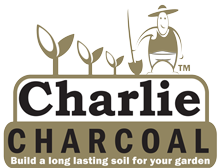

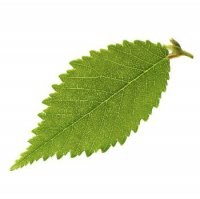
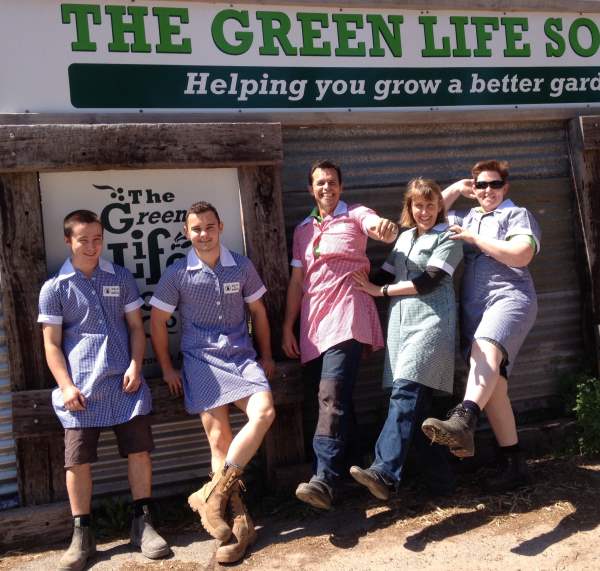
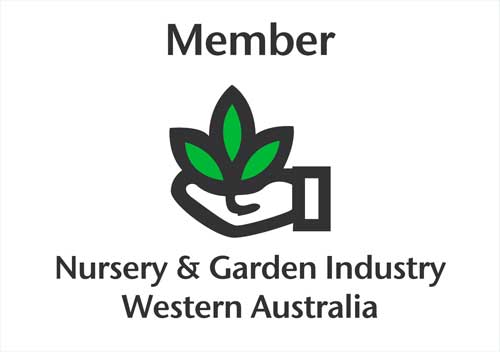
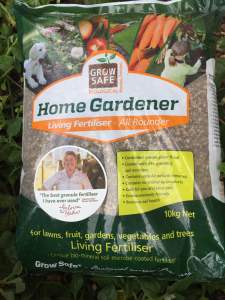 Fertilise! As things are now waking up from winter, NOW is a great time to fertlise citrus and other fruit trees, your existing vegie plants, lawns, roses, your flowering annuals & spring bulbs - pretty much everything in the garden! But a word of caution - do consider the type of plant, and its needs generally first. If it's a tough plant (native or otherwise) that has proven itself in the garden thriving on neglect; aside from a small amount of a soil improver or adding a small handful of slow release, it may not be necessary to feed it much. Over fertilizing can lead to lots of sappy leaf growth that will only attract insects to eat it! Find out where that plant originated from, and try to replicate those conditions. Plants from countries with rich volcanic soil will need more regular feeding than those who originate from dry, sandy deserts for example. See our article below which talks about fertilisers in more detail.
Fertilise! As things are now waking up from winter, NOW is a great time to fertlise citrus and other fruit trees, your existing vegie plants, lawns, roses, your flowering annuals & spring bulbs - pretty much everything in the garden! But a word of caution - do consider the type of plant, and its needs generally first. If it's a tough plant (native or otherwise) that has proven itself in the garden thriving on neglect; aside from a small amount of a soil improver or adding a small handful of slow release, it may not be necessary to feed it much. Over fertilizing can lead to lots of sappy leaf growth that will only attract insects to eat it! Find out where that plant originated from, and try to replicate those conditions. Plants from countries with rich volcanic soil will need more regular feeding than those who originate from dry, sandy deserts for example. See our article below which talks about fertilisers in more detail..jpg) Plant out your seedlings. Unless you live in a frost-prone region, you're pretty safe now to get your seedlings outside and into your garden beds. Should you be in frost-prone areas (eg. some parts of the Perth hills) you might like to wait a few more weeks, unless you keep an eye on the weather forecast and take precautions if it looks like we're in for a cold snap. Our new range of organically grown vegie seedlings from the Perth Hills Veggie Co will be coming on stream slowly from now on. Things have been a little slow to get going due to the cold/wet July we had which has set things back a few weeks. Jackie French says in "Backyard Self-sufficiency" - folklore wisdom says to plant tomatoes out 'when the soil is warm enough to sit on with bare buttocks'... So Perhaps if it's too cold to drop your dacks, it's too cold to get out your Black Russians, as well!
Plant out your seedlings. Unless you live in a frost-prone region, you're pretty safe now to get your seedlings outside and into your garden beds. Should you be in frost-prone areas (eg. some parts of the Perth hills) you might like to wait a few more weeks, unless you keep an eye on the weather forecast and take precautions if it looks like we're in for a cold snap. Our new range of organically grown vegie seedlings from the Perth Hills Veggie Co will be coming on stream slowly from now on. Things have been a little slow to get going due to the cold/wet July we had which has set things back a few weeks. Jackie French says in "Backyard Self-sufficiency" - folklore wisdom says to plant tomatoes out 'when the soil is warm enough to sit on with bare buttocks'... So Perhaps if it's too cold to drop your dacks, it's too cold to get out your Black Russians, as well!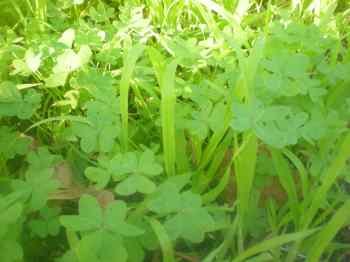 Weeding. Again. Still. I've noticed that some things in the garden are JUST starting to set seeds, so now's the time to deal with as many as possible before the seed gets spread around ready to germinate next year. Set yourself up with a great podcast (like 'All The Dirt') on your iPod or smartphone, and listen while you work! Weeds without seeds make a great addition to your compost pile. Once seeds have set, unless you're able to ensure the temperature of your compost is hot enough for long enough - be aware that any seeds in the pile may be viable and germinate.
Weeding. Again. Still. I've noticed that some things in the garden are JUST starting to set seeds, so now's the time to deal with as many as possible before the seed gets spread around ready to germinate next year. Set yourself up with a great podcast (like 'All The Dirt') on your iPod or smartphone, and listen while you work! Weeds without seeds make a great addition to your compost pile. Once seeds have set, unless you're able to ensure the temperature of your compost is hot enough for long enough - be aware that any seeds in the pile may be viable and germinate.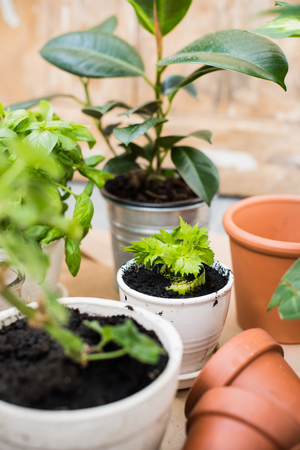 Get potty! Re-pot and tidy up your indoor plants, and other pot plants around the place. As you'll be spending more time in your outdoor entertaining area, it's time to sweep away the cobwebs, tidy things up and give your babies a prune and a feed so they'll be looking their best. We have our certified organic potting mix, blueberry mix (for your acid loving plants) and a succulent mix available for your pots. Or if you want to have some extra water holding for pots and planters going towards summer, try our square foot mix. Hanging baskets, trailing plants and (brace yourselves) even macrame pot holders are all bang on-trend right now, so get growing!
Get potty! Re-pot and tidy up your indoor plants, and other pot plants around the place. As you'll be spending more time in your outdoor entertaining area, it's time to sweep away the cobwebs, tidy things up and give your babies a prune and a feed so they'll be looking their best. We have our certified organic potting mix, blueberry mix (for your acid loving plants) and a succulent mix available for your pots. Or if you want to have some extra water holding for pots and planters going towards summer, try our square foot mix. Hanging baskets, trailing plants and (brace yourselves) even macrame pot holders are all bang on-trend right now, so get growing! 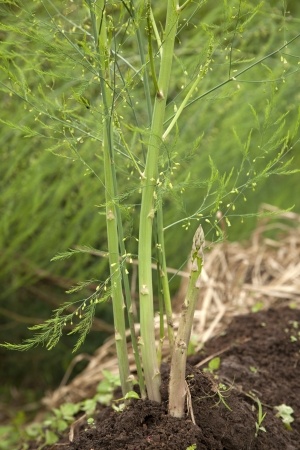 There's still time to get in a crop of potatoes and be enjoying them by Christmas (there's that word again). And Rhubarb and Asparagus - be quick; we don't have too many asparagus crowns left.
There's still time to get in a crop of potatoes and be enjoying them by Christmas (there's that word again). And Rhubarb and Asparagus - be quick; we don't have too many asparagus crowns left. GLSC has always stocked an autumn/winter green manure pack. This year, we've managed to get a blend made of seeds suitable for warm season/summer growing. These packs are now available in store and online (1kg/$13.50 will cover approx. 20m2) and contain a mixture of sunflowers, millet, buckwheat, panicum, mung and soy bean, canola, safflower, alfalfa, triticale. Green manure is grown to slash and dig back into the soil, in order to increase the amount of organic matter.
GLSC has always stocked an autumn/winter green manure pack. This year, we've managed to get a blend made of seeds suitable for warm season/summer growing. These packs are now available in store and online (1kg/$13.50 will cover approx. 20m2) and contain a mixture of sunflowers, millet, buckwheat, panicum, mung and soy bean, canola, safflower, alfalfa, triticale. Green manure is grown to slash and dig back into the soil, in order to increase the amount of organic matter.  Feed the Soil - not the plants.
Feed the Soil - not the plants. 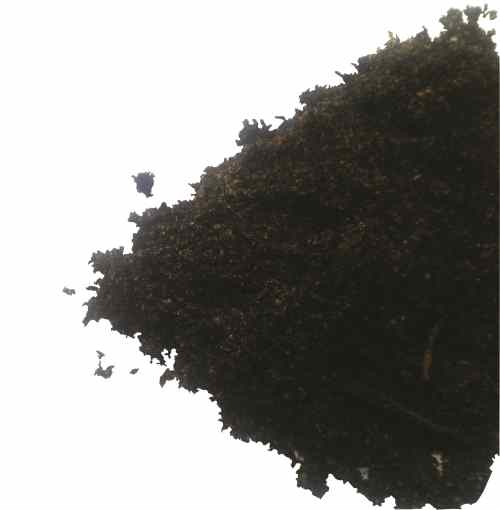 Chemical components - relates to the elements that are in the soil; things like iron, magnesium, phosphorus, nitrogen, calcium (etc.) that are necessary building blocks for plant cells. Everything has a chemical component; but the issue for gardeners is about balancing nutrition and dealing with deficiencies and (in much of Perth) excesses that can be just as detrimental to healthy plant growth. There's also the effect of pH to consider in nutrient availability.
Chemical components - relates to the elements that are in the soil; things like iron, magnesium, phosphorus, nitrogen, calcium (etc.) that are necessary building blocks for plant cells. Everything has a chemical component; but the issue for gardeners is about balancing nutrition and dealing with deficiencies and (in much of Perth) excesses that can be just as detrimental to healthy plant growth. There's also the effect of pH to consider in nutrient availability. The biological side of soil tends to take care of itself when you add organic matter. Compost and manure isn't sterile (or at least it shouldn't be). A huge range of micro-organisms are required in the decomposition process, so when you're adding organic matter to your garden, you're usually adding more microscopic critters - or at the very least - adding a food source for those already in your soil. Many fertilisers today contain added beneficial microbes; or you can even buy them from us to add to your soil. Is it necessary to add microbes? Possibly not, but it's something some gardeners like to play with - and their are benefits to microbial tea brews in really boosting soil biology. (photo shows microscopic view of soil - the long strands are fungi)
The biological side of soil tends to take care of itself when you add organic matter. Compost and manure isn't sterile (or at least it shouldn't be). A huge range of micro-organisms are required in the decomposition process, so when you're adding organic matter to your garden, you're usually adding more microscopic critters - or at the very least - adding a food source for those already in your soil. Many fertilisers today contain added beneficial microbes; or you can even buy them from us to add to your soil. Is it necessary to add microbes? Possibly not, but it's something some gardeners like to play with - and their are benefits to microbial tea brews in really boosting soil biology. (photo shows microscopic view of soil - the long strands are fungi)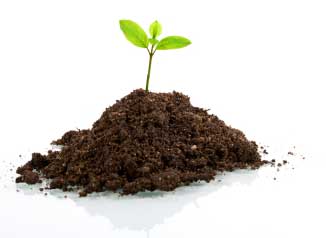 Here are some pro's and con's to consider when trying to decide which approach is best for your plants:
Here are some pro's and con's to consider when trying to decide which approach is best for your plants: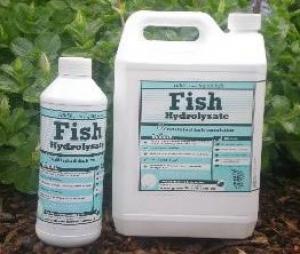 Fish Hydrolysate - a concentrated fish fertiliser that provides a great source for soil microbes. It also stinks. But it's great stuff. Certified Organic.
Fish Hydrolysate - a concentrated fish fertiliser that provides a great source for soil microbes. It also stinks. But it's great stuff. Certified Organic.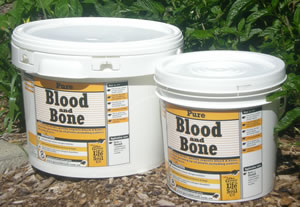 Blood and Bone - our own blend that contains no fillers. It is made with blood meal, feather meal and has added rock dust. A high quality, very popular product. A great general purpose fertliser; add a handful of potash for a 'complete' organic garden food.
Blood and Bone - our own blend that contains no fillers. It is made with blood meal, feather meal and has added rock dust. A high quality, very popular product. A great general purpose fertliser; add a handful of potash for a 'complete' organic garden food.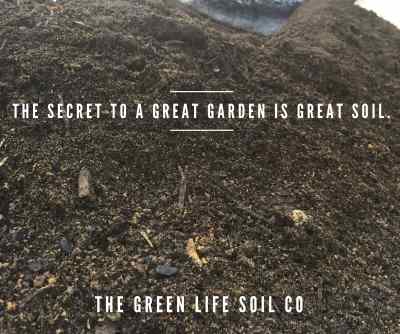 In addition we carry compost (quality compost, Certified Organic), manure (sheep & cow), our own Concentrate blends (a great choice as a complete soil improver), Charlie Charcoal, Clay products for water holding, straw mulches for adding organic matter and a whole range of minerals which play specific roles in amending soils. We're happy to help advise you on what you need, or you can browse our website for more information on the range we carry - what the products are and how you'd use them.
In addition we carry compost (quality compost, Certified Organic), manure (sheep & cow), our own Concentrate blends (a great choice as a complete soil improver), Charlie Charcoal, Clay products for water holding, straw mulches for adding organic matter and a whole range of minerals which play specific roles in amending soils. We're happy to help advise you on what you need, or you can browse our website for more information on the range we carry - what the products are and how you'd use them.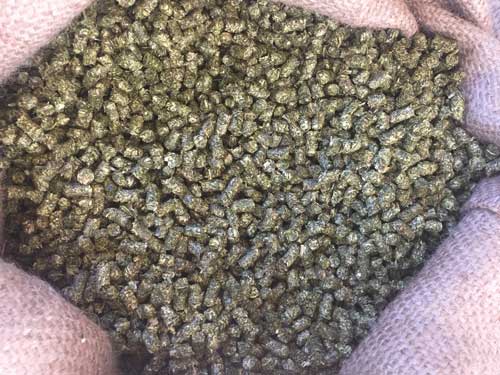 Lucerne Pellets. A NEW product we have for you - we've tried it and we really like it! So do the worms! We have a number of customers trialling it for us and we'll be passing on their comments in the future; but we expect it will be a popular way for people to mulch and feed pot plants (no smell and very convenient to use!), roses (who will love the nitrogen) and vegie gardens (but be aware it is conventionally grown lucerne and NOT certified organic - if that's important to you). We have it in plain 15L bags which normally retail for $20; but for our VIP's for the month of September we're offering them at a $16/bag as an introductory special. We'd love lots of you to try them and let us know what you think!
Lucerne Pellets. A NEW product we have for you - we've tried it and we really like it! So do the worms! We have a number of customers trialling it for us and we'll be passing on their comments in the future; but we expect it will be a popular way for people to mulch and feed pot plants (no smell and very convenient to use!), roses (who will love the nitrogen) and vegie gardens (but be aware it is conventionally grown lucerne and NOT certified organic - if that's important to you). We have it in plain 15L bags which normally retail for $20; but for our VIP's for the month of September we're offering them at a $16/bag as an introductory special. We'd love lots of you to try them and let us know what you think! 




